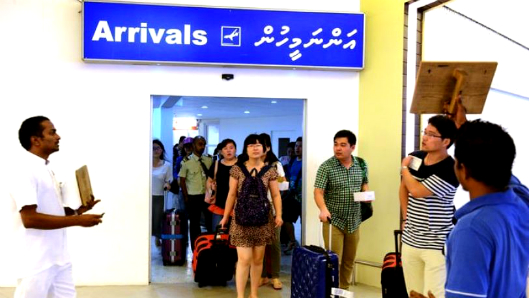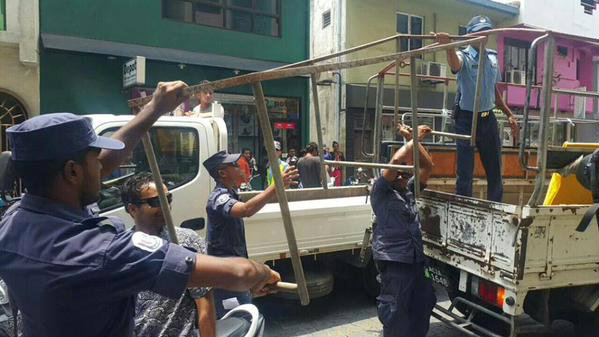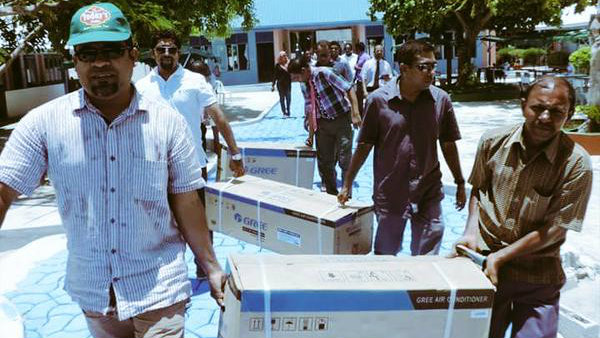The Supreme Court today sentenced ruling party MP Ahmed Nazim, a former close associate of the president, to 25 years in jail on corruption charges, stripping him of his parliamentary seat.
Nazim, an ex-deputy speaker of parliament, was found guilty of defrauding the state of MVR 1.4 million (US $91,400) by submitting bids on behalf of non-existent companies to supply 15,000 national flags to the now-defunct atolls ministry.
The conviction completes Nazim’s fall from grace at a time when the opposition has accused the government of targeting political rivals. Nazim, who helped President Abdulla Yameen found a party in 2008, appears to have fallen out of favour with the government.
The High Court in February 2013 acquitted Nazim on the basis that the witnesses, who had been his employees, were not credible, based on a Supreme Court precedent that testimony by accomplices to a crime is inadmissible .
However, the Supreme Court today unanimously ruled the employees were simply following Nazim’s orders in the scam, which took place in 2004.
Nazim’s downfall will trigger a parliamentary by-election in Meemu atoll Dhiggaru.
There are three more outstanding corruption charges against Nazim, which also involve the use of “paper companies” to win bids for the procurement of 220 harbor lights, sound systems for mosques and an additional 15,000 flags.
The police have previously said Nazim gained US$400,000 in total from the scams.
Police in October withheld the MP’s passport on unrelated charges of blackmail.
Tourism Minister Ahmed Adeeb at that time blamed Nazim for a damning report implicating him in a separate US$6million corruption scandal, and also accused Nazim of defamation following his refusal to support Nazim’s bid to become Speaker of parliament.
Scams
The scams, first flagged in an audit report in 2009, also involved ruling Progressive Party of the Maldives MP ‘Red Wave’ Ahmed Saleem and President Yameen’s half-brother Abdulla Hameed. Their cases are still pending at the High Court.
Saleem was the director of finance at the atolls ministry and Hameed was the minister at the time, while Nazim ran a company called Namira Engineering. Saleem and Hameed are charged with abuse of power and violation of state finance regulations.
During the original trial held at the Criminal Court, the then-employees of Nazim’s Namira Engineering testified under oath that they were instructed by Nazim to bid for the projects – however, the presiding judge concluded from their testimonies that they were responsible for the procurement fraud and therefore dismissed the testimonies against Nazim on all counts.
According to the audit report, documents of the company which won the bid, Malegam Tailors, showed that it shared the same phone number as Namira. Fast Tailors, another company that applied, also shared a different number registered under Namira.
Another company, Needlework Tailors, which submitted the bid, had an employee of Namira sign the documents under the title of general manager, while a fourth company named ‘Seaview Maldives Private Maldives’ did not exist.
Auditors noted that the Seaview bid documents had an exact date error also found in Fast Tailors documents, and said the error was sufficient to prove the same party had prepared both bids.
The prosecution began in late 2009 after police uncovered evidence that implicated Hameed, Saleem and Nazim in a number of fraudulent transactions.
At a press conference in August 2009, police exhibited numerous quotations, agreements, tender documents, receipts, bank statements and forged cheques showing that Nazim received over US$400,000 in the scam.
Police further alleged that MP Saleem actively assisted from the atoll ministry, while Nazim’s wife Zeenath Abdullah abused her position as a manager of the Bank of Maldives’ Villingili branch to deposit proceeds of the fraudulent conspiracy.
Police said Hameed as minister played a key role in the fraud by handing out bids without public announcements, making advance payments using cheques against the state asset and finance regulations, approving bid documents for unregistered companies and carrying out discriminatory treatment of bid applicants.
A hard disk seized during a raid of Nazim’s office in May 2009 allegedly contained copies of forged documents and bogus letterheads. Police alleged that money was channelled through the scam to Nazim, who then laundered cash through Namira Engineering and unregistered companies.





